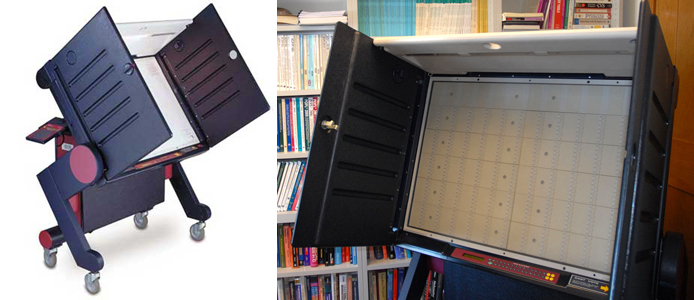
HACKENSACK—While former Special Counsel Robert S. Mueller warned a packed Senate hearing July 24 that Russia was moving to interfere with 2020 elections “as we sit here” and a bipartisan federal report just concluded that election cybersecurity was “sorely lacking,” Bergen County election officials say the over 20-year-old voting machines used here are safe and secure.
Although New Jersey was not one of 21 states targeted by Russian hackers in the 2016 presidential election, state and county officials have efforts underway to secure and expand upon election security and election upgrades.
Patricia DiCostanzo, Bergen County superintendent of elections, said the AVC Advantage machines used in most of Bergen’s 70 municipalities are not connected to the internet and record votes on a secure cartridge inside the machine immune to tampering.
She said that there has never been any evidence of hacking or tampering with the machines.
“We’re in good shape here in Bergen County” for 2019 elections and beyond, said DiConstanzo.
DiCostanzo estimated should Bergen County want to replace its voting machines with ones that generate a paper ballot backup— which election security experts prefer—it would cost $7,000 to $10,000 per machine or $8.4 million to $12 million.
“Nothing’s likely to happen [with replacements] until after the presidential election,” she said.
However, most national and state election security experts say without a “paper trail” or record of each voter’s ballot cast, the so called “paperless” or direct-recording electronic voting machines used in 19 of 21 New Jersey counties, including Bergen, are not secure.
DiCostanzo disputes that assertion based on two decades of overseeing secure voter ballots in Bergen County.
National election security experts note that such “paperless” voting machines are not secure and in case of a malfunction, breakdown, or worse case, a security breach that affects the tabulation of votes cast, there is no paper record of voters’ ballots to refer back to to confirm election results.
According to published reports, New Jersey is only one of eight states nationwide to still be heavily reliant on direct-recording electronic (DRE) machines, which provide no paper record of each vote cast.
Critics allege so-called DRE machines are vulnerable to possible tampering and a 2004 Mercer County lawsuit decided over a decade ago called on the state to replace DRE machines with voting machines that provide a paper trail.
The lawsuit sparked legislation in 2007 that called on counties to replace paperless voting machines with a machine providing a “voter-verified paper record” but no funding was appropriated by state lawmakers then and no paper back-up retrofitting took place.
DiCostanzo said because AVC Advantage machines used by Bergen County are not connected to the internet, they are not vulnerable to online hackers who may attempt to manipulate votes or tamper with election tallies.
She said the AVC Advantage voting machines, purchased in 1996, have nine separate seals that prevent any tampering and she said the approximate 3,000 election workers at polling places are also well aware of potential tampering signs.
She said the county has looked at three new voting machines that would provide a paper record and recently conducted a pilot test of a new AVC Advantage machine with a paper ballot. This machine requires voters to review and approve votes recorded on a paper ballot before the voter can finish voting.
She said the new AVC Advantage machines with a paper ballot were pilot tested in Haworth in June’s primaries and will be pilot tested again in Little Ferry during the November elections.
“I thought it went great; every voter liked it. It’s not that much of a change. It’s similar other than the fact that you can check and see how you voted on the paper ballot,” said DiCostanzo.
She added, “Voters think they will get a paper receipt, they won’t. The ballot stays with the machine.”
DiCostanzo said Bergen County did not receive any funds from approximately $10 million available in last year’s New Jersey state department election security grant funding. The state funds were part of a $380 million Helping America Vote Act (HAVA) federal program focused on improving election security nationwide following widespread election cyberattacks by Russian operatives during the 2016 election.
New Jersey Secretary of State Tahesha Way worked with county election officials and state election officials to map out spending categories for county/local efforts including: cybersecurity, physical security, training, communication, voter registration system, voting equipment, election auditing and Americans with Disabilities Act compliance.
In an NJTV interview, Way said New Jersey’s mostly paperless electronic voting machines are secure and “to our knowledge we have never been made aware of any election security breaches in New Jersey.”

‘No way to audit results’
According to The Center for American Progress, New Jersey’s election system is among the least secure in the nation, “in large part because there is no way to independently audit ballot results should a hacker meddle with the programming of one or more election machines,” states the organization.
When Pascack Press/Northern Valley Press reached out to the New Jersey Municipal Clerks Association July 30 to get a better understanding of election security issues, president Diane Pflugfelder said she would seek feedback at an upcoming board meeting and get a sense of concerns expressed by a sampling of their membership.
State offers $10M in grants
In summer 2018, New Jersey received a $9.76 million federal grant, and with a state match of $488,000, offered about $10.2 million in funding for county election security initiatives.
The money was part of $380 million in federal funds appropriated for HAVA to enhance election security nationwide.
Using the federal funds, state efforts to enhance election security include: a pilot program to lease or purchase a small number of voting machines that use a “voter-verified paper trail”; update existing voting machine and seal tracking systems; conducting election result audits of new machines; establishing a new “election security liaison” position to undertake countywide inspection and remediation of deficiencies in physical security of voting machines, election material, data, and devices used in the electoral process.
Only a small portion of the $10 million in grants was allocated to a limited pilot project to begin purchasing and testing voting machines that provide a paper record of a voter’s choices—which election security experts contend is New Jersey’s Achilles’ heel in election security.
In contrast, DiCostanzo firmly believes that the county’s machines that record votes on a cartridge and provide no paper record are secure and don’t need immediate replacing.
State officials concur that New Jersey’s elections are secure, including Secretary of State Way. The Department of State is in charge of administering New Jersey’s $10.2 million grant program to upgrade election security.
However, according to the Brennan Center for Justice in New York, the $380 million appropriated nationwide for security prior to 2020 elections is not nearly enough to ensure election security and the nonprofit, nonpartisan law and policy institute noted New Jersey did not get enough money to replace its electronic voting machines, which it estimates to cost $40.4 million to $63.5 million.
The center called the 2018 federal grants “an excellent first step” which need to be followed up by more federal funding to help states secure voting results. The center also urged state and local officials to “prepare to step in to fill the void left by Congress.”
‘Paperless’ machines vulnerable?
In 2016, a Princeton professor demonstrated how a paperless AVC Advantage voting machine could be hacked—in approximately seven minutes—when he broke into and replaced one of the machine’s computer chips with a chip that enabled him to manipulate the machine’s election results.
In order to do this, a hacker would need to break into the physical machine and replace a specific computer chip.
DiCostanzo said that the professor’s hacking was a highly unlikely scenario and could not be accomplished in Bergen County given tight pre- and post-election security on voting machines.
DiCostanzo said the machines are kept secure and security-sealed to prevent any vote tampering.
She said county employees begin delivery about two weeks before elections, generally delivering two machines to each polling place, where a municipal clerk signs off on their receipt and machines are secured at each polling place.
She said Bergen County distributes 1,200 voting machines to its 561 voting districts that include 329 polling places.
